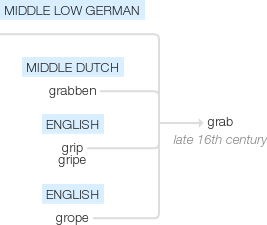Grab
late 16th century: from Middle Low German and Middle Dutch grabben ; perhaps related to grip, gripe, and grope.
wiktionary
From Middle Dutch grabben(“to grab”) or Middle Low German grabben(“to snap”), from Proto-Germanic *grab-, from Proto-Indo-European *gʰrebʰ- (compare Sanskrit गृह्णाति(gṛhṇā́ti), गृभ्णाति(gṛbhṇā́ti, “he seizes”), Avestan 𐬔𐬀𐬭𐬆𐬡 (garəβ, “to seize”)). Cognate with Danish grabbe(“to grab”), Swedish grabba(“to grab”), Old English ġegræppian(“to seize”), Middle English grappen(“to feel with the hands; grope”), Macedonian грабне(grabne, “to snatch”), Bulgarian грабвам(grabvam, “to snatch”).
Arabic and Hindighurb?: crow, raven, a kind of Arab ship. This etymology is incomplete. You can help Wiktionary by elaborating on the origins of this term.
etymonline
grab (v.)
"seize forcibly or roughly," 1580s, from Middle Dutch or Middle Low German grabben "to grab," from Proto-Germanic *grab-, *grap- (source also of Old English græppian "to seize," Old Saxon garva, Old High German garba "sheaf," literally "that which is gathered up together"), from PIE *ghrebh- (1) "to seize, reach" (source also of Sanskrit grbhnati "seizes," Old Persian grab- "seize" as possession or prisoner, Old Church Slavonic grabiti "to seize, rob," Lithuanian grėbti "to rake"). Sense of "to get by unscrupulous methods" was reinforced by grab game, a kind of swindle, attested from 1846. Related: Grabbed; grabbing.
grab (n.)
1777, "thing grabbed;" 1824, "act of grabbing, a sudden grasp or seizing" from grab (v.). Up for grabs attested from 1945 in jive talk.
